Digital Poster
AI-Based Acquisition & Reconstruction: Part III
ISMRM & ISMRT Annual Meeting & Exhibition • 10-15 May 2025 • Honolulu, Hawai'i

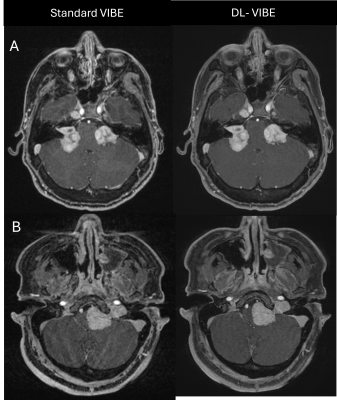 |
Computer Number: 65
2642. Validation
of Deep Learning Volume Interpolated Breath-hold Exam (VIBE)
versus Standard VIBE for Detecting Internal Auditory Canal
Lesions.
C. H. Chiang, S. Buathong, A. Hajati, A. Tabari, W-C Lo, D.
Nickel, B. Clifford, R. Sellers, S. F. Cauley, J. Conklin,
S. Y. Huang
Department of Radiology, Massachusetts General Hospital, Boston, United States
Impact: DL-VIBE supports efficient clinical workflows
and reliable diagnostics compared with standard VIBE,
encouraging wider adoption of DL-based MRI protocols.
|
|
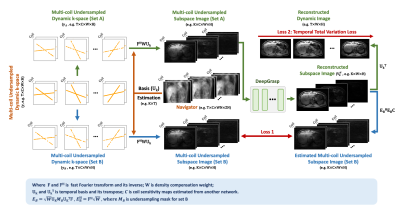 |
Computer Number: 66
2643. Highly-Accelerated,
Free-Breathing, Time-Resolved 4D Golden-Angle Radial MRI with
Self-Supervised Learning
H. Pei, D. Xia, Y. Wang, H. Chandarana, D. Sodickson, L.
Feng
New York University Grossman School of Medicine, New York, United States
Impact: The proposed DeepGrasp technique allows for
shorten data acquisition and efficient image reconstruction
without requiring reference images for network training,
providing significant potential for different clinical
applications such as DCE-MRI or MRI-guided radiotherapy.
|
|
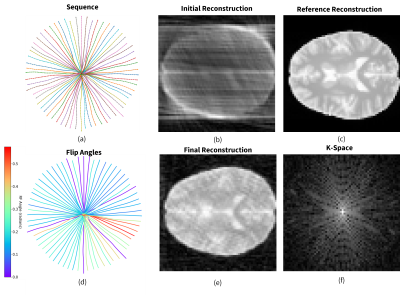 |
Computer Number: 67
2644. MRI
Pulse Sequence Discovery with Joint Optimization of B-spline
parameterized Trajectory and Sequence Parameters
S. Hussain, J. Huber, M. Günther, D. Hoinkiss
Fraunhofer MEVIS, Bremen, Germany
Impact: This method enables design of optimized MRI
sequences tuned to specific imaging objectives, opening
possibilities for application-specific sampling patterns and
optimized sequences across diverse imaging tasks.
|
|
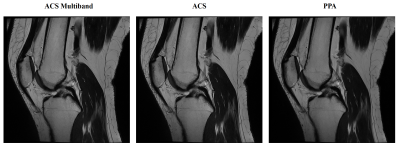 |
Computer Number: 68
2645. Application
of AI-assisted compressive sensing technique combined with
multiband technique in knee MRI scanning
M. Yang, H. l. Zhang, X. Yang, Q. Zhang, Z. Lin, Y. Guo, G.
Li, X. Xin
Department of Radiology, Nanjing Drum Tower Hospital, Affiliated Hospital of Medical School, Nanjing University, No. 321, Zhongshan Road, Nanjing, Jiangsu, 210008, China , Nanjing, China
Impact: ACS Multiband and ACS improve MRI efficiency and
patient comfort while preserving diagnostic quality
|
|
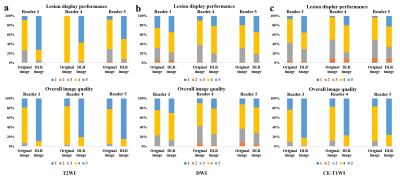 |
Computer Number: 69
2646. Preoperative
MRI-based Deep Learning Reconstruction and Classification Model
for Assessing Rectal Cancer
L. Chen, Y. Yuan, S. Ren, H. Lu, F. Shen
Changhai Hospital, Naval Medical University, Shanghai, China
Impact: Deep learning reconstruction could improve the
image quality of rectal MRI and enhance the diagnostic
performance for the TN stage of rectal cancer, which could
be used to promote visualization and diagnostic performance
in patients with rectal cancer.
|
|
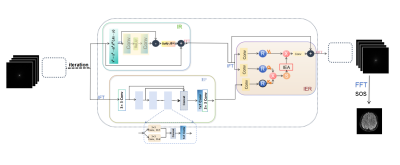 |
Computer Number: 70
2647. Edge-Guided
Reconstruction of Multi shot Diffusion MRI Using Projection
Iteration Threshold Deep Network
X. Liu, H. Guo, C. Luan, H. Zhang
Shenyang University of Technology, Shengyang, China
Impact: This study introduced EPISTA+,
a deep learning technique that integrates physical
reconstruction model with image edge constraints to enhance
the image quality of multi-shot DWI. This method improves
image quality of high-resolution DWI and enhances diagnostic
reliability in clinical settings.
|
|
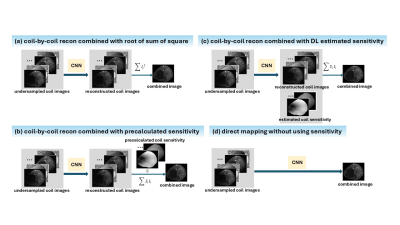 |
Computer Number: 71
2648. Deep
learning-based MR image reconstruction: coil-by-coil
reconstruction versus direct mapping
Y. Wu, M. Hu, C. Alkan, J. Oscanoa, Y. Ma, A. Syed, C. Liao,
C. Huang, M. Alley, F. Zhang, A. Sun, J. Pauly, S.
Vasanawala
Stanford University, Stanford, United States
Impact: Comparing DL-based direct mapping with
coil-by-coil reconstruction and incorporating coil
sensitivity in different ways are two fundamental questions
in multi-coil MRI reconstruction. This work provides
evidence that implicit estimation and integrated use of coil
sensitivities may provide improved reconstruction.
|
|
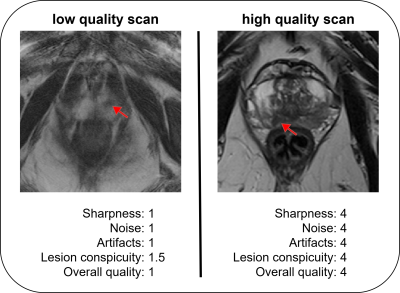 |
Computer Number: 72
2649. Deep
Learning Reconstruction Enables Accelerated Prostate MRI Without
Compromising Reader-Assessed Visual Quality
S. Fransen, Q. van Lohuizen, G. Yiasemis, J. Twilt, C.
Roest, Y. Arita, J. Borstlap, J. Fütterer, M. de Rooij, D.
Rouw, I. Schoots, B. Turkbey, S. Whitney, F. Simonis, J.
Teuwen, H. Huisman, D. Yakar, T. Kwee
University Medical Center Groningen, Groningen, Netherlands
Impact: DL-based
reconstruction can generate high-quality T2-weighted
prostate MRIs from accelerated acquisitions without any
perceived loss in overall visual quality by expert
radiologists compared with the original non-accelerated
images.
|
|
 |
Computer Number: 73
2650. Single-spiral
MRE image reconstruction using zero-shot self-supervised deep
learning towards real-time stiffness mapping
S. Martin, F. Zimmermann, J. Schattenfroh, P. Schuenke, I.
Sack, C. Kolbitsch, A. Kofler
Physikalisch-Technische Bundesanstalt (PTB), Braunschweig and Berlin, Germany
Impact:
The proposed self-supervised reconstruction ensures accurate elastogram estimation from highly undersampled data, reducing scan time. These developments promise to further enhance MRE’s impact and efficiency in clinical practice. |
|
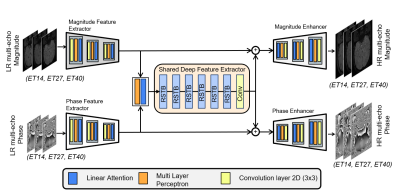 |
Computer Number: 74
2651. Complex
Swin Transformer for Accelerating Enhanced SMWI Reconstruction
M. Usman, S-M Gho
Heuron Co., Ltd., Seoul, Korea, Republic of
Impact: This research enables high-quality SMWI
generation from reduced k-space
data, accelerating scan times while preserving diagnostic
detail. The approach could significantly enhance SMWI's
clinical application for Parkinson’s Disease and support
faster, more efficient neuroimaging workflows.
|
|
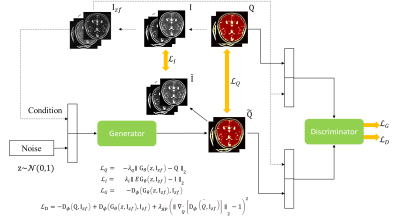 |
Computer Number: 75
2652. Uncertainty-aware
Quantitative MRI Reconstruuction using conidtional Wasserstein
GAN
H. Sun, Z. Li, R. Yang, Z. Xu, H. Li, X. Lin, H. Chen
Tsinghua University, Beijing, China
Impact: The study offers clinicians and researchers a
reliable qMRI reconstruction method with pixel-wise
uncertainty assessment. This could spark further
investigations into model reliability and potentially
facilitate the practical application of deep learning-based
qMRI methods.
|
|
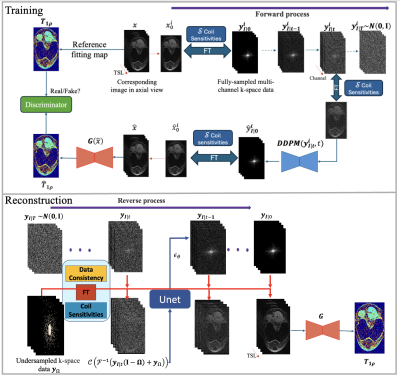 |
Computer Number: 76
2653. Accelerated
cartilage T1ρ mapping with Denoising Diffusion Probabilistic
Model (DDPM) and Generative Adversarial Network (GAN)
R. Liu, Z. Zhang, P. Huang, J. H. Kim, M. Yang, X. Li, L.
Ying
University at Buffalo, Buffalo, United States
Impact: We studied the combination of DDPM with GAN for
accelerated T1ρ imaging where both T1ρ-weighted images and
T1ρ maps are obtained simultaneously from accelerated scans.
The proposed method shows improvement over the competing
methods.
|
|
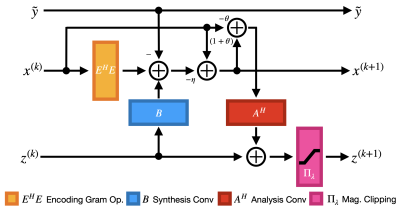 |
Computer Number: 77
2654. Joint
MRI Reconstruction and Denoising Using Noise-Adaptive
Self-Supervised Learning
N. Janjusevic, A. Khalilian-Gourtani, Y. Wang, L. Feng
Bernard and Irene Schwartz Center for Biomedical Imaging, New York University Grossman School of Medicine, New York, United States
Impact: LPDSNet surpasses current methods, especially
under mismatched noise-level conditions between training and
testing, making it highly effective for noisy,
limited-sample MRI datasets and promising for low-SNR,
low-field MRI applications.
|
|
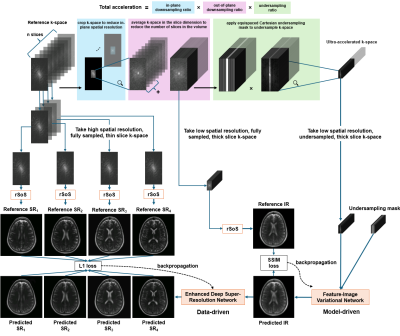 |
Computer Number: 78
2655. Ultra-acceleration:
compounding AI reconstruction methods with end-to-end training
to achieve over fifty-fold acceleration.
J. Grover, S. Shan, P. Keall, D. Waddington
The University of Sydney, Sydney, Australia
Impact: Our work demonstrates compounding acceleration
techniques can shorten the acquisition time of MRI by over
50 times. This finding is a step towards real-time
volumetric MRI for interventional guidance.
|
|
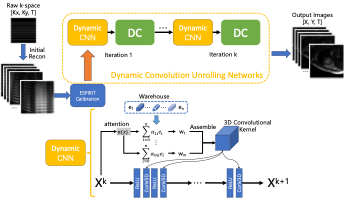 |
Computer Number: 79
2656. Dynamic
Convolution Unrolling Networks for Cardiac Cine MR
Reconstruction
D. Gan, J. Cheng, Y. Zhu, D. Liang
Shenzhen Institutes of Advanced Technology, Chinese Academy of Sciences, Shenzhen, China
Impact: This study introduces an efficient tool for
cardiac CINE MRI reconstruction, enhancing image quality for
clinical use and supporting accurate diagnoses. It also
provides valuable insights for advancing future dynamic
reconstruction methodologies in medical imaging.
|
|
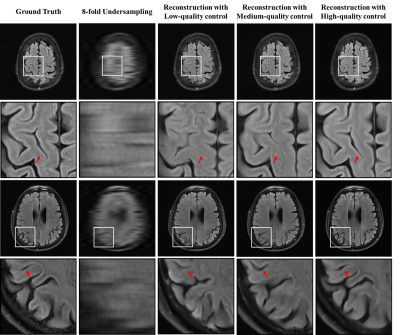 |
Computer Number: 80
2657. Investigating
the Impact of Control Information on Fidelity of Detail Recovery
in Latent Diffusion Models for Undersampled MRI Reconstruction
X. Tang, K. Tong, L. LI, Y. ZHANG, L. YAN, J. GUAN
Shenzhen Technology University, Shenzhen, China
Impact: A key prerequisite for translating LDM-based MRI
reconstruction methods into clinical practice is resolving
the trade-off between detail richness and fidelity. Our
research contributes to advancing solutions for the
reconstruction fidelity challenge.
|
The International Society for Magnetic Resonance in Medicine is accredited by the Accreditation Council for Continuing Medical Education to provide continuing medical education for physicians.